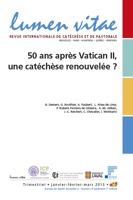 previous article in this issue previous article in this issue | next article in this issue  |

|
Document Details : Title: Les unités pastorales dans le diocèse de Plaisance-Bibbio Author(s): BUSANI, Giuseppe Journal: Lumen Vitae Volume: 67 Issue: 1 Date: 2012 Pages: 61-71 DOI: 10.2143/LV.67.1.2983474 Abstract : La contribution examine la situation du diocèse de Piacenza-Bobbio, encore fortement enraciné dans la tradition catholique, comme représentative des évolutions en Italie. Le réaménagement envisagé suit une «logique intégrative» (valoriser au sein des unités pastorales l’enracinement et les spécificités locales et les mettre en réseau) plutôt qu’«agrégative ou fusionnelle» (supprimer les petites paroisses au profit d’un centre unique). This article examines the situation of the diocese of Piacenza-Bobbio, which is still firmly rooted in the Catholic tradition, as a representative of the changes under way in Italy. It shows how pastoral reorganisation is seeking to take into account new sociological realities, such as the high degree of mobility in the population between winter (present mainly in the city and suburbs) and summer (move to the hillsides in the country), and documents how the diocese is trying to move from a 'clerical reform' focused on priests to a 'reform of the Church' in its relationship to contemporary culture. The redevelopment envisaged follows a logic of 'integration' (emphasising rootedness and local specificities within pastoral units and creating networks among them) rather than of 'aggregation or merger' (eliminating small parishes in favour of a single centre). The institutions put in place (pastoral unit council, which reflects together on programming, lay persons of reference for the communities, a ministerial team with a pastor-moderator, and including the religious as well as priests, deacons and laypeople, encouragement of community life for priests, territorial episcopal vicar) help make this reorganisation into a true act of ecclesial communion at the service of the proclamation of the Gospel, even though the pastoral units thus created have yet to be 'built up' in reality. |
